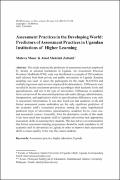Assessment Practices in the Developing World: Predictors of Assessment Practices in Ugandan Institutions of Higher Learning
Abstract
This study analysed the predictors of assessment practices employed
by faculty at selected institutions in Uganda. An Assessment Practices
Inventory Modified (APIM) scale was distributed to a sample of 350 academic
staff selected from both private and public universities in Uganda. Random
sampling was used to select the participants for this study. MANOVA and
multiple regression analysis were employed for data analysis. Differences were
revealed in faculty assessment practices according to their academic levels and
specialisations, and not in the type of universities. Differences in academic
levels cut across all the assessment practices sub-scales (design, administration,
interpretation, and application) while in specialisations differences were only
in assessment interpretation. It was also found out that academic levels and
formal assessment course undertaken are the only significant predictors of
the academic staff’s assessment practices among the many hypothesised
predictors (type of universities, specialisations, academic levels, class size,
and assessment course). Generally, from the descriptive results of this study
it has been noted that academic staff in Ugandan universities lack appropriate
assessment skills in assessing their students. This has led to a recommendation
that formal assessment training programmes should be made mandatory to all
academic staff in universities in Uganda in order to improve their assessment
skills to ensure quality in the way they assess students.
Collections
- Research Papers [35]

